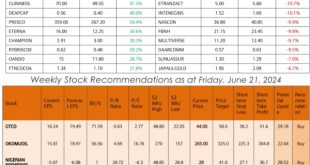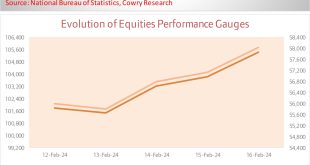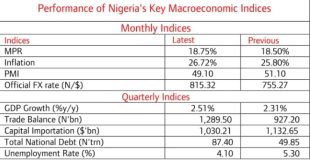Ambitious Growth Initiatives and Fiscal Caution…
On November 29, 2023, President Bola Tinubu of Nigeria unveiled the FY-2024 national budget, totaling N27.50 trillion, reflecting a 10.8% increase from the previous year. Aptly themed ‘Budget of Renewed Hope,’ the focus is squarely on economic growth, job creation, and infrastructure development. The budget’s financial foundation relies on a mix of oil and non-oil sources, coupled with planned borrowings.

The planned expenditure for the coming year 2024 is on the backdrop of the prevailing global and domestic challenges. All things being equal, the success of the proposed budget is based on the assumptions that Nigeria’s inflation rate will taper to 21.4% in 2024 and the real GDP growth rate will be at 3.76% on an exchange rate of N750/$1 at the official FX window, barring any market distortion and a planned daily crude oil production of 1.78mbpd which will translate into an oil price benchmark at $77.96 per barrel.
Looking back at the FY-2023 budget, inclusive of a recently approved supplementary budget, data reveals a 79.3% performance in gross oil and gas revenue, amounting to N5.58 trillion as of September 2023. Net oil and gas revenue faced a 20.7% shortfall, settling at N2.93 trillion, while net non-oil revenue exceeded expectations by N1.62 trillion, with only Customs revenue underperforming by 27%.

As of September 2023, the Federal Government of Nigeria (FGN) achieved a retained revenue of N8.65 trillion, surpassing the prorata target. Oil revenues constituted 84.7%, totaling N1.42 billion, and non-oil tax revenues reached N2.50 trillion, a remarkable 135% performance. Noteworthy were Corporate Income Tax (CIT) and Value Added Tax (VAT) collections, exceeding targets significantly at 221.4% and 111%, respectively. Customs collections, however, fell short at 73% of the target.
Aggregate expenditure for FY-2023, including the supplementary budget, was estimated at N24.82 trillion, with actual spending at N12.7 trillion. A considerable portion, N5.79 trillion, was allocated for debt service, and N3.78 trillion for personnel costs. Capital expenditure for Ministries, Departments, and Agencies (MDAs) reached only N1.47 trillion, attributed in part to the introduction of the “Bottom-up Cash Plan” arrangement. The fiscal deficit for FY-2023 was projected at N13.79 trillion, with an actual deficit of N4.05 trillion, primarily financed by domestic borrowing.
Looking ahead to FY-2024, the budget allocates N6.48 trillion to personnel and pension costs, representing 35.4% of projected aggregate revenues. The allocated amount for capital expenditures in 2024 is N8.70 trillion, surpassing the 2023 provision. The projected fiscal deficit for 2024 is N9.18 trillion, accounting for 50% of total FGN revenues and 3.88% of the estimated GDP.
Revenue projections for 2024 stand at N18.32 trillion, with N7.94 trillion (43.3%) from oil-related sources and N10.39 trillion from non-oil sources. The budget reflects a positive shift towards increased spending on education (8.00% or N2.18 trillion) and infrastructure development (5% or N1.32 trillion), addressing critical areas for economic growth.
For Cowry Research, we think that the 2024 budget for Nigeria signals a commendable commitment to economic growth, job creation, and infrastructure development, aligning with the administration’s strategic priorities. A pivotal aspect of the budget is th e substantial increase in education spending, constituting almost 8.00% or N2.18 trillion of the total bud get. This focused investment acknowledges the pressing need to address the educational requirements of Nigeria’s burgeoning youth population, aiming to enhance the quality of education and broaden access across the nation. Furthermore, the allocation of 5% or N1.32 trillion for infrastructure development is a crucial step toward alleviating the longstanding infrastructure deficit, with the anticipated improvements in roads, bridges, and power infrastructure expected to enhance the overall business environment and attract foreign investment.
However, a noteworthy concern emerges from the substantial allocation of N8.25 trillion to debt servicing, surpassing the allocation for education. This prioritization raises questions about the opportunity cost of diverting a significant portion of government revenue away from productive sectors of the economy. Another point of economic scrutiny is the ambitious non-oil revenue projection of N10.39 trillion for 2024, marking a considerable increase from the current year’s projection of N8.73 trillion as we think that the feasibility of achieving this growth, particularly in the context of existing economic challenges and security issues, remains unclear.
Additionally, the allocation ratio between the health sector (5% or N1.33 trillion) and the defense and security sector (12% or N3.25 trillion) raises questions about the prioritization of these critical sectors while taking cognizance of the security situation across the country; just in the bid to attract foreign investments and as well, drive growth.
EQUITIES MARKET: ASI Sustains Bull-Run as Investors Cherry-Pick on Value Stocks….
This week, the benchmark notched 0.27% week on week to close at 71,419.87 points after testing a new level of 71,566.58 basis points on the strength of highly priced stocks and low cap companies hitting new 52-week highs in the face of increasing macroeconomic headwinds, weak economic growth and impressive corporate earnings that had supported prices and buoyed investor confidence in the equity space.
After a volatile trading month of November which recorded a 3.08% M-o-M gains, December kickstarted on a high note with trading activities on the Nigerian stock market staying positive for another week, signaling upbeat momentum in investor’s optimism as they continue taking a bet on Nigerian stocks amidst improved buying interest.
However, the market cap declined by 0.23% week on week to N39.08 trillion due to the delisting of UNION BANK PLC from the daily list of the exchange which resulted in a loss of N90.4 billion as we observed strategic moves by investors who saw opportunities in low-priced equities on the strength of better than expected numbers from these companies and market sentiments with high anticipation of the forthcoming dividend season, and the potential impact of the Santa-Claus rally. Meanwhile,the year-to-date return of the index inched to an impressive 39.35%
While the overall market performance was positive, our detailed analysis indicates a minor setback in the Consumer Goods, Industrial and Insurance indexes as they declined by 0.47%, 1.23% and 2.03% respectively pressured sell-offs across counters such as OMATEK, GUINEAINS, NEIMETH, HONEYFLOUR and RTBRISCOE. Conversely, the Banking and the Oil & Gas indexes recorded gains of 1.92% and 5.97%, respectively, propelled by notable price increases in FBNH, SEPLAT, ETI, ACCESSCORP, OANDO and ZENITH.
Elsewhere, the level of trading activity witnessed an uptick in the face of slightly positive market breadth as there was a 4.88% increase in total traded volume, reaching 2.54 billion units in weekly deals, with the number of trades advancing by 8.75% to 36,138. Also, the weekly traded value experienced an uptick of 70.50%, totaling N38.64 billion. Top performers for the week, included MECURE, NNFM, FBNH, SEPLAT and NESTLE, with each securing impressive gain of 41%, 25%, 11%, 10% and 10%, respectively from their previous week’s close. Conversely, stocks like DAARCOMM, UNITYBNK, and UBA faced declines in their share prices, experiencing price decreases of -21%, -16%, and -15%, respectively, on a week-on-week basis.
For Cowry Research, the upcoming weeks promise a dynamic and multifaceted landscape for investors to navigate as we anticipate profit-taking and corrections after the recent market surge, potentially fortifying future upside potential. This is expected as investors assess global events, fixed income yields, and CBN policies. Earnings reports will be closely watched, acting as barometers for economic health and sector-specific performance. Economic data, encompassing inflation, employment, and GDP growth, will significantly influence market sentiment and stability. The CBN’s policy decisions on interest rates are poised to be key determinants in shaping market dynamics. Global geopolitical factors and trade relations will play a crucial role in investors’ risk assessments and decision-making. Portfolio adjustments are likely as market participants strategically position themselves amid December trends and potential financial market resets. Amidst all these, we maintain our advice to investors on taking positions in stocks with sound fundamentals and whose earnings yield and earnings per share support higher payout ratio.
 MMS PLUS NG – Maritime, Aviation, Business, Oil and Gas News Online Newspaper with coverage in Maritime, Oil and Gas, Aviation, Power and Energy as well as Financial News
MMS PLUS NG – Maritime, Aviation, Business, Oil and Gas News Online Newspaper with coverage in Maritime, Oil and Gas, Aviation, Power and Energy as well as Financial News






